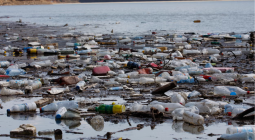Thailand bans imports of plastic waste to curb toxic pollution
Campaigners welcome move but say success depends on enforcement and global agreement on a treaty
Thailand has banned plastic waste imports over concerns about toxic pollution, as experts warn that failure to agree a global treaty to cut plastic waste will harm human health.
A law banning imports of plastic waste came into force this month in Thailand, after years of campaigning by activists. Thailand is one of several south-east Asian countries that has historically been paid to receive plastic waste from developed nations. The country became a leading destination for exports of plastic waste from Europe, the US, the UK and Japan in 2018 after China, the world’s biggest market for household waste, imposed a ban.
Japan is one of the biggest exporters of waste plastic to Thailand, with about 50m kg exported in 2023.
Thai customs officials said more than 1.1m tonnes of plastic scraps were imported between 2018 and 2021.
Penchom Sae-Tang, the director of the NGO Ecological Alert and Recovery, said: “The ban on all plastic scrap imports should be seen as a triumph for civil society in preventing hazardous waste entering Thailand.” But she warned vigilant monitoring and robust cooperation with authorities would be vital to make sure the ban was enforced.
Imports of plastic were often mismanaged in Thailand, with many factories burning the waste rather than recycling it, leading to damage to human health and the environment.
Punyathorn Jeungsmarn, a plastics campaign researcher at the Environmental Justice Foundation, said: “While this is a great step forward for Thailand, there is more work to be done. After the law comes into effect, the Thai government must work to ensure its enforcement and implementation. This means industrial, environmental and customs agencies must cooperate to prevent any illicit imports of plastic waste … the current law does not address the transit of plastic waste, meaning Thailand could be used as a transit state to send waste to our … neighbours. The Thai government must guard against this.”
The ban comes into force as discussions continue in an attempt to rescue the global plastic waste treaty. Last year nations failed to agree the final wording of the treaty after talks in Busan. More than 100 countries supported a draft text that included legally binding global reductions in plastic production, which stands at more than 400m tonnes annually, and phasing out certain chemicals and single-use plastic products.
But the resistance of oil-producing countries including Saudi Arabia, Iran and Russia to cuts in production led negotiators to concede defeat.
Prof Steve Fletcher, the director of the Revolution Plastics Institute at the University of Portsmouth, said a failure to agree a treaty to end plastic pollution was a threat to human health.
“Plastic pollution is now recognised as not only an environmental crisis but also a critical human health crisis. The need for decisive international action to tackle plastic pollution has never been more urgent,” he said.
In an article in the British Medical Journal, Fletcher said the unresolved disagreements at the treaty talks over cuts to production hindered progress towards a global agreement to protect human and environmental health.
Emerging research shows that there are substantial health risks from microplastic exposure, including increased risk of stroke, hearth attack and death. Some studies suggest microplastics play a role in dementia, the article said.
Burning plastic as a method of waste management posed severe health risks, which was compounded by the trade in plastic waste, he said.
Dr Cressida Bowyer, the deputy director of the Revolution Plastics Institute, which has carried out research into the dangers of open burning of plastic waste, said: “With 16% of global municipal waste burned openly, rising to 40-65% in low-and middle-income countries, vulnerable populations bear the brunt of this crisis. The toxic fumes from burning plastic are a silent but deadly contributor to global health burdens. Urgent action is needed.”
No date has yet been agreed for further discussions on the global treaty to end plastic waste.
Cover photo: A worker sorts plastic waste for recycling in Samut Prakan province, Thailand. Photograph: Anadolu/Getty Images




